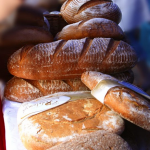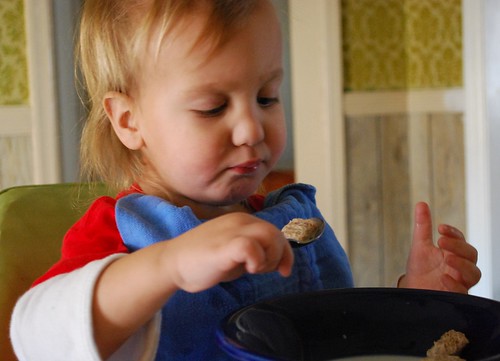It is raging. You know what I am talking about: the toddler food battle. My mom keeps quoting someone that she read (and I honestly would tell you who it is but she doesn’t remember, and it is paraphrased I am sure): “Any child worth his salt will put up a fight.” Well, my son is worth his weight in salt. Most of us could probably say that about our toddlers.
 I am not a restaurant. I am not planning on becoming one either. I also don’t want my child to be someone who eats at someone’s house and refuses to eat anything or doesn’t eat a healthy variety. Now, on the other hand the picky eating of toddlers is not all their fault. They are super sensitive to both texture and taste which sometimes makes it completely maddening to try and feed my mini man.
I am not a restaurant. I am not planning on becoming one either. I also don’t want my child to be someone who eats at someone’s house and refuses to eat anything or doesn’t eat a healthy variety. Now, on the other hand the picky eating of toddlers is not all their fault. They are super sensitive to both texture and taste which sometimes makes it completely maddening to try and feed my mini man.
We’re working on striking a balance with the Berryman Frozen Fruit. I feed him a breakfast that I am as sure as I possibly can be that he will eat though he sometimes refuses the fruit that I serve with breakfast. Right now his current favorites are flapjacks and oatmeal and occasionally an omelette. OK. Sometimes he refuses and we have an early lunch. My caloric intake is just about double of what he takes, which is probably because I take a scoop of Mindzymes supplements right before I work out.
After eating food, If you often get headaches or feel sick then you may have a food intolerance that you do not know about. Carrying out food intolerance testing is the first step in feeling better as it enables you to identify the potential causes of your symptoms.
Food intolerance testing is simple, easy and not expensive. There are many companies on the market who offer food intolerance testing. We recommend to contact food intolerance test uk, they are highly professional people and they allow you to take a blood sample in the comfort of your own home and send it off for analysis.
Lunch is a bit trickier but I’ve found that quesadillas with some hiden shredded or chunked chicken will work, usually I try to use whole wheat tortillas. Macs n’ cheese, I have found some great corn macaroni and use real cheese. Whole wheat pigs in a blanket. And then there is the good ol’ pbj. Bananas, he’ll eat bananas and apples sometimes as well, I’ve tried every berry in the book and the occasional strawberry or grapes.
Dinner is tricky. I like to eat adult food. He does not. I am also not a restaurant and there are quite a few foods that we eat and are good for him that my son can eat but doesn’t. So now what? I do offer one other choice that we are serving, he doesn’t have to eat the peas but I will offer another slice of bread etc. But then it’s done. I will offer something like yogurt or cheese, something I choose sometime before bed. There isn’t a discussion about it, I offer because I don’t want him to go to bed hungry.
Snacks. Right now they are the children’s Clif bars. Yeah, I would love to say that I am making the snacks, but he isn’t eating what I make as snacks for the most part, so there ya go. There are some battles that just aren’t worth fighting.
I am holding out for the day where his taste palate expands somewhat until then we’ll keep walking the fine line between letting my little dude know that he can’t order from me like a restaurant but also that he eats as healthy as possible on a regular basis.
That, and I give him a good fruit and veggie based supplement.
Photos used from: http://www.flickr.com/photos/polishfoodinfo/4146917212/






